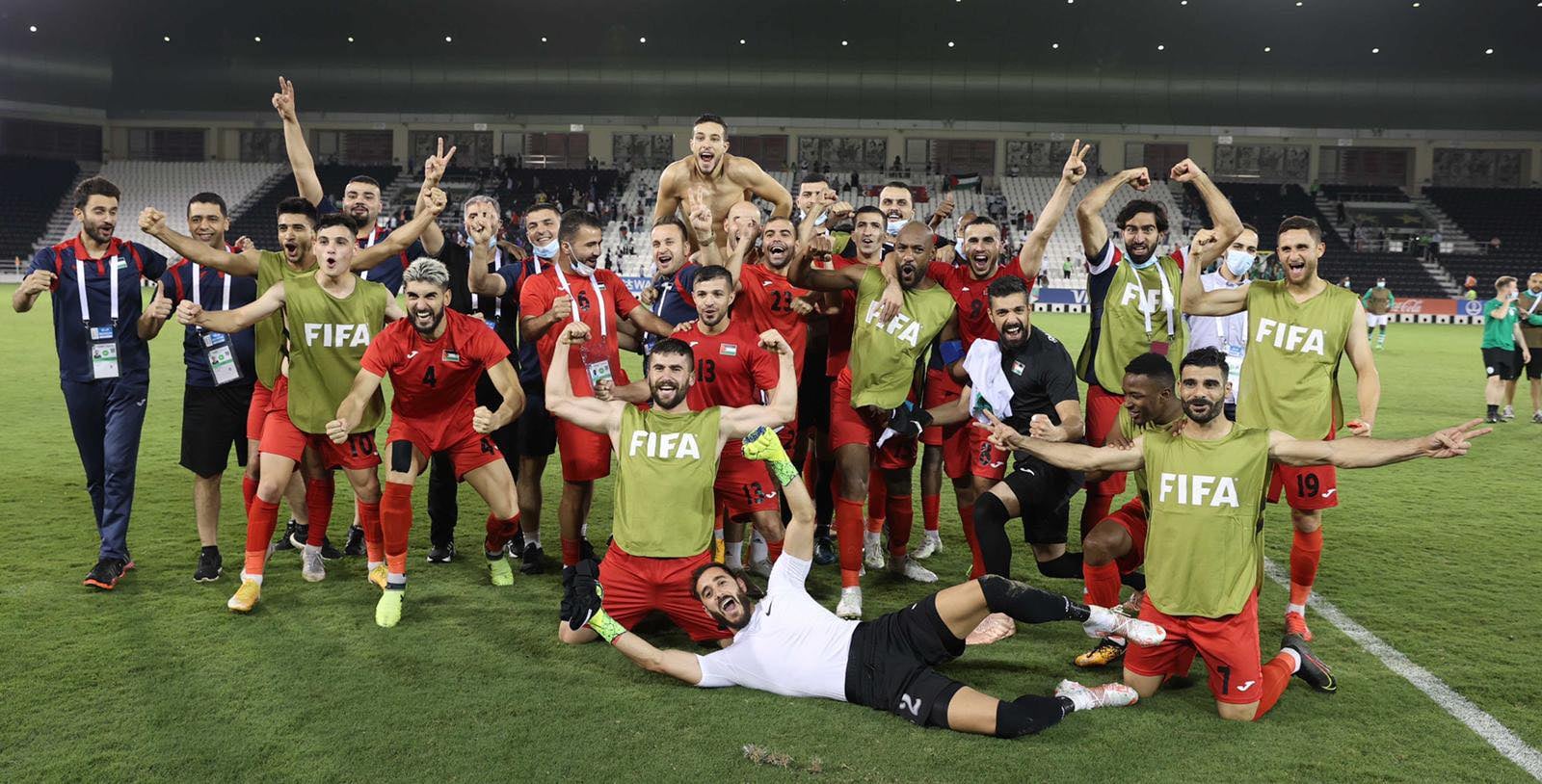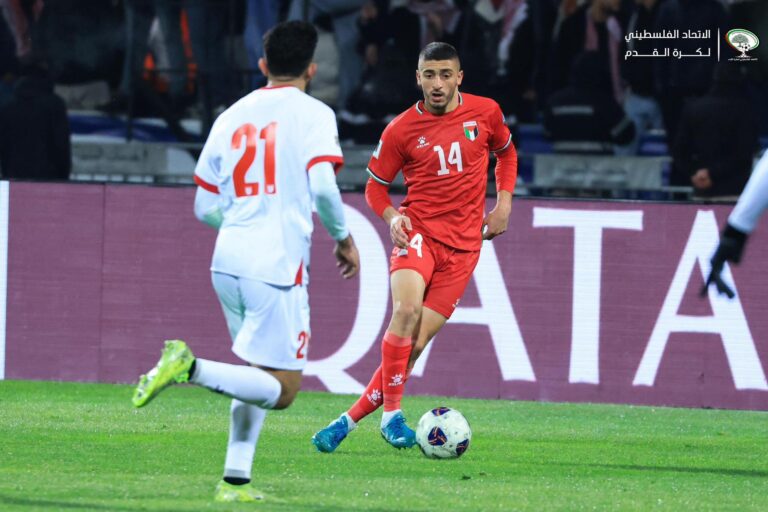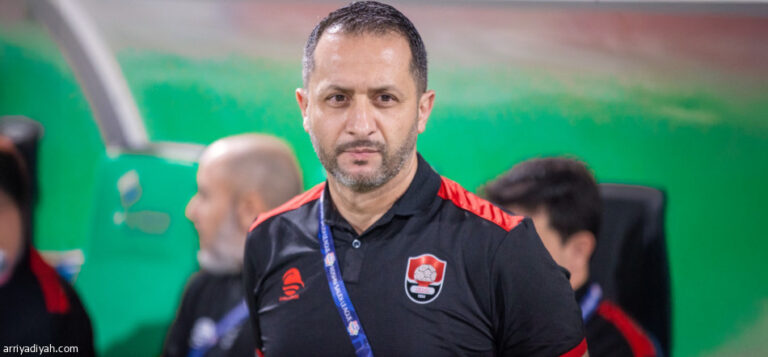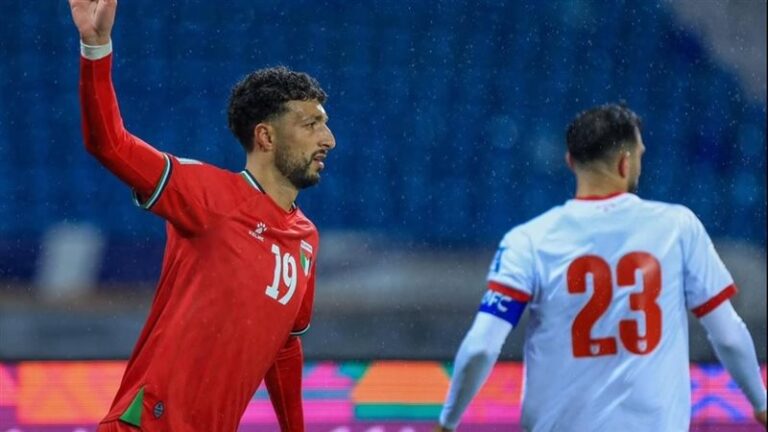For the past decade, Makram Dabboub has been in the employ of the Palestine Football Association in one form or the other. The former goalkeeper made his way to the Holy Land by way of Mokthar Tlili who was appointed as manager of Palestine’s Olympic Team back in 2009.
Tlili lasted in the role for two years delivering some good results and developing several players who would go on to play for the senior team. As the side’s goalkeeping coach, Dabboub was tasked in developing a promising but young goalkeeper- Toufic Ali Abuhammad- into a professional that could fulfill the promise of his lanky two meter frame.
Initially, the young goalkeeper struggled to get power behind his goal kicks but gradually began to improve several aspects of his game. Less than six years after meeting Dabboub, Toufic Ali started for Palestine against Iraq at the 2015 Asian Cup and made waves when he saved a penalty kick from Iraqi legend Younis Mahmoud.
Which brings us to this moment in late November 2021. Toufic Ali, for the first time in a decade, will not be part of the Palestine set up in any way, shape, or form. The man who was his mentor and who stubbornly stuck by him even as his understudy Rami Hamadi kept on proving his mettle in the WBPL, delivered the hammer blow. The Toufic Ali project is over. Palestine’s final 23 man squad for the FIFA Arab Cup is as follows:
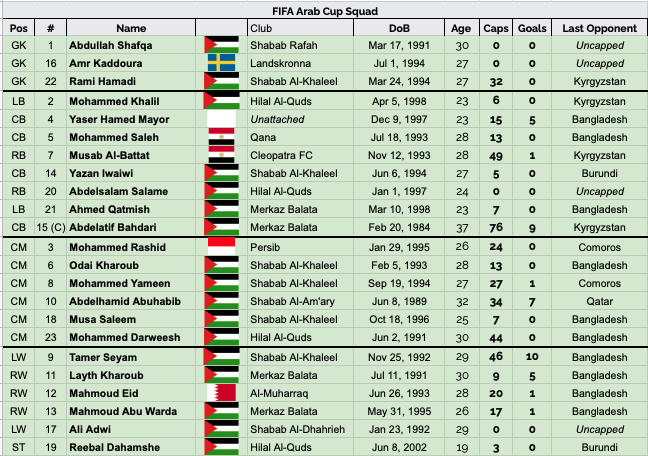
Form over Favor
Toufic Ali was not the only stalwart to be left out of the side for the 2021 FIFA Arab Cup. Makram Dabboub made several tough calls when putting his side together. Sameh Maraaba had been an integral part of Palestine’s post Australia 2015 rebuild but was excluded from the side due primarily to the fact that he is not a fit for the 4-3-3 or the 3-4-3 formation Dabboub trotted out in his first five games in charge.
Khaled Salem might have secured a big money move to Al-Hidd in the Bahraini League, but he too had been a reclamation project for six different managers over the course of his national team career. At 32 years of age it was quite clear that unlocking the forward’s raw talent was going to be virtually impossible. Two atrocious performances in friendlies against Kyrgyzstan and Bangladesh sealed his fate.
While pushing out the aforementioned Maraaba and Salem were moves that were largely expected, the decision to drop Musa Farawi was not. The 24 year old fell victim to his decision to move to Shabab Al-Khaleel a protracted legal battle with Hilal Al-Quds prevented him from getting consistent playing time and although he did participate in the internal training camp last month, Dabboub took the decision to drop him from the squad.
In June, Islam Batran showcased his ability to provide a spark to the team first as a starter in a 3-0 win over Yemen, providing assists on two of Palestine’s three goals and later as a substitute against Comoros- scoring the side’s fifth goal in a 5-1 win. His reticence in signing a WBPL contract- he signed for Jabal Al-Mukaber last week- cost him game time and as such a place in the squad.
While we all would like to see more Gaza League players included (third choice Abdallah Shaqfa is the sole representative) the league’s delayed start definitely did not help several candidates state their case
Palestine without many of its top players
Much will be made about the players who are not at Doha at the moment but it is hard to allocate blame to the coaching staff for those absences. The preliminary 35 man squad included the likes of Oday Dabbagh, Saleh Chihadeh, Badr Mousa and Mahmoud Wadi but with the tournament scheduled outside of FIFA’s official match days clubs were under no obligation to release them.
Where they could the coaching staff did work to gain concessions from clubs and scored a major coup when Persib agreed to release Mohammed Rashid. Musab Al-Battat, who has been released by Cleopatra FC, will give Palestine’s attack an element of unpredictability.
On the domestic front, even if there was a rapprochement between Abdallah Jaber and the PFA- Sakhnin would absolutely refuse to release him for this tournament. While many have clamored for Shehab Qombor it is obvious that he has been singled out by the Palestine Football Association for daring to question his suspension. The Jabal Al-Mukaber forward traveled back home during the Saudi Arabia game after coming down with a stomach bug and after the PFA decided to suspend him from appearing even at club level- his Jabal Al-Mukaber teammates staged a walk off.
The PFA eventually backed down but his national team ban remains in place even if the powers that be try to convince the general public that the player is afraid of flying.
The tournament’s dates may have weakened Palestine but the side is far from depleted. In the heart of defence, Palestine have three capable center backs (Bahdari, Hamed Mayor, Saleh) which is something the side did not have at either of the last two Asian Cups.
Palestine also have their number one goalkeeper, Rami Hamadi, and a capable deputy in Amr Kaddoura, who has been one of the best shot stoppers in Sweden since getting his first call up to the national team back in December 2018.
There is a full tandem of midfield options. The three Mohammeds (Darweesh, Rashid, Yameen) are available and the side can lean on Tamer Seyam, Mahmoud Eid, Mahmoud Abuwarda, and Laith Khraoub.
How will Palestine line up?
As mentioned earlier, Dabboub will most likely use the same 4-3-3 formation he used in the dismantling of Comoros, Yemen, and Singapore earlier this year. If he does revert to type, he will have nearly all the starters from that campaign in place. The only exception being Oday Dabbagh.
Palestine kick off their Arab Cup Campaign against its toughest possible opponent- Morocco who can count on former Al-Ahly striker Walid Azaro, Karim El Berkaoui (who notched 15 goals for Al-Raed in Saudi Arabia last season), Zamalek’s Achraf Bencharki, and 2020 CHAN top scorer Sofiane Rahimi.
Morocco are not only favorites to win the group but favorites to win the entire tournament- so could we see a more defensive Palestine in the first game? Makram Dabboub did experiment with a three man back line in Palestine’s last friendly against Bangladesh and while it remains a work in progress, the Tunisian would have weeks to drill his team on the finer points of playing with a three man defence.
If Dabboub does opt for a more defensive posture against Morocco it will most certainly not look like a 3-4-3 and instead look more like a 5-2-3 or even a 5-4-1 in defence. It would be counter to how Dabboub has approached his mission thus far; pressing opponents high up the pitch and concentrating the majority of play away from their own goal.
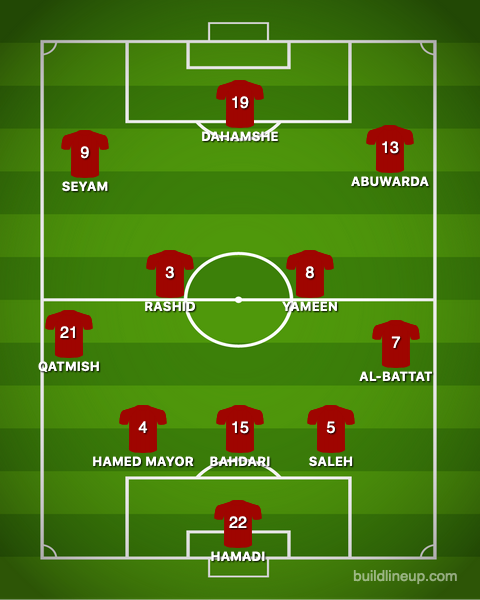
If Dabboub does go with the defensive option the aim would be to frustrate a Morocco side that has very little experience playing with one another in the hopes that none of their players are able to unlock Palestine’s low block with a killer pass in restricted space.
Given that 90% of his charges played three competitive games under his stewardship and were successful in his preferred formation scoring twelve and conceding just once against Singapore, Yemen, and Comoros it is more likely that we see Dabboub stick with what got him here.
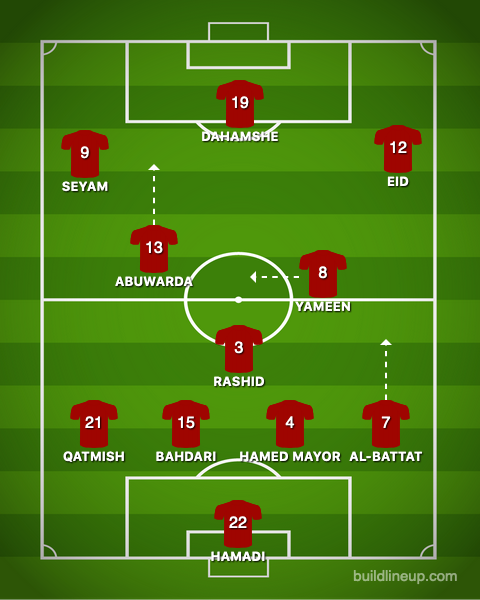
How far can they go?
Palestine are really up against it and are a victim of their own success; their local league produced the prodigious talents of Abdallah Jaber, Mahmoud Wadi, and Oday Dabbagh and with all of them moving on to more established leagues and clubs. Al-Fida’i also suffered another blow with the surprise retirement of Nazmi Albadawi, when they secured the services of former Croatia U21 international Muhamed Alghoul, were incredibly unfortunate to see him go down with injury.
The squad is solid but there are question marks at three positions, and against quality opposition, it is asking a lot of certain players to step up with so little experience under their belt.
Perhaps Qatmish and Dahamshe will take the challenge head on, and perhaps a solution in the form of a combination of Abuwarda/Abuhabib plugs the Nazmi Albadawi shaped hole in midfield.
That said, Palestine getting out of its group would be a surprise given the talent Morocco possesses and the fact that Jordan is playing with its first team with the exception of Belgium based Musa Al-Tamari.
If the team can produce good football- even in the face of defeat- that should be considered a success as should any improvement on their 2019 Asian Cup Campaign which generated two points, zero goals scored, and a dour game plan that excluded any attacking intent.

